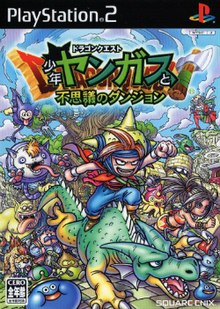| Dragon Quest: Young Yangus and the Mystery Dungeon | |
|---|---|
 | |
| Developer(s) | Cavia |
| Publisher(s) | Square Enix |
| Director(s) | Yoshimasa Asao |
| Producer(s) |
|
| Designer(s) | Yuji Horii |
| Artist(s) | Akira Toriyama |
| Writer(s) | Fuminori Ishikawa |
| Composer(s) | Koichi Sugiyama |
| Series | |
| Platform(s) | PlayStation 2 |
| Release |
|
| Genre(s) | Action role-playing, Roguelike |
| Mode(s) | Single-player |
Dragon Quest: Young Yangus and the Mystery Dungeon is 2006 action role-playing game developed by Cavia and published by Square Enix as part of the Mystery Dungeon and Dragon Quest series. The game is a prequel to Dragon Quest VIII.
Gameplay
Young Yangus and the Mystery Dungeon utilizes randomly generated dungeons and combat taken in turns. Players must fight through different floors of enemies until they reach a boss monster, which they must defeat to advance through the story. Combat takes place on contact with enemies, with no separate battle screen or menu system. A new feature to the series is the "tension command", that allows players to build up attack power to deliver strong blows upon enemies, though the character cannot move in this state. Later on in the game, and players can capture monsters with a special jug, and use them to attack opponents. Players may keep three monsters in their possession at any one time, and can be taught to use special abilities by using items and through combat experience. Monsters must reach level four, be given foods they like, and also a weapon before they will assist Yangus, and as they fight more and more, they will combine their strengths with other captured monsters. Players can also utilize a farmhouse late game where monsters can be kept and bred to create new and more powerful monsters. The game also uses cinematic and computer generated scenes with a comic-book style.
Story
The game centers around the character Yangus, one of the main characters in Dragon Quest VIII, as a child. Described as a "plump bandit", he becomes involved with his father Yampa's gang of thieves when a mysterious jug is brought home. Though instructed not to touch the jug, Yangus does, and is sucked inside the bottle into another world called "Bottle Land". Red, a female bandit from Dragon Quest VIII also appears in this new world, as well as Morrie, Torneko, and a new character named Poppy, and each begins to explore the dungeons of this new land.
Development
A trailer for the game was shown in December 2005. The game's soundtrack features music by Koichi Sugiyama from Dragon Quest VIII arranged by Hayato Matsuo.
Reception
The game ranked third in Japan for game sales for the week of April 17 to April 23 in 2006. The title sold over 340,000 copies in Japan by November 2006, according to Square Enix's IR, and ranking number 42 in sales overall for the year. The game was noted for its "cartoonish 3D graphics", and its full motion video was also praised. The original art style and cell-shaded graphics were highlighted for praise as well. IGN described the dungeon movement system in the game as "clumsy". The narration of the game was thought to be hilarious, due to the narrators acting out of various characters parts. The protagonist of the game, Young Yangus, would later appear in other games in the Dragon Quest franchise such as Fortune Street in 2011 and Dragon Quest Rivals as part of an event in 2019.
Notes
References
- ^ Stealth (July 8, 2012). "Top 10 Dragon Quest Games". Destructoid. Archived from the original on March 1, 2013. Retrieved 2012-08-04.
- ^ Anoop Gantayat (April 24, 2006). "Dragon Quest Yangus: Import Playtest". IGN. Archived from the original on September 27, 2011. Retrieved 2012-08-04.
- ^ Andrew Alfonso (May 1, 2006). "Dragon Quest: Young Yangus' Mysterious Dungeon". GameSpy. Archived from the original on July 17, 2012. Retrieved 2012-08-04.
- Hirohiko Niizumi (January 30, 2006). "Four million Dragon Quest VIIIs shipped". GameSpot. Archived from the original on November 6, 2012. Retrieved 2012-08-04.
- ^ Staff (December 19, 2005). "Jump Fest 2005: Square Enix and Mistwalker show upcoming titles". GameSpot. Archived from the original on November 3, 2012. Retrieved 2012-08-04.
- Anoop Gantayat (December 17, 2005). "Eyes On: Dragon Quest Yangus". IGN. Archived from the original on March 11, 2012. Retrieved 2012-08-04.
- Greening, Chris (10 January 2010). "Hayato Matsuo Interview: Dark Orchestral Writing". Game Music Online. Archived from the original on 29 November 2014. Retrieved 18 August 2014.
- Thorsen, Tor (May 1, 2006). "Japan game charts: April 17-23". GameSpot. Retrieved June 13, 2020.
- "2006年ゲームソフト年間売上TOP500" [2006 Game Software Annual Sales Top 500]. Famitsū Gēmu Hakusho 2007 ファミ通ゲーム白書2007 [Famitsu Game Whitebook 2007] (in Japanese). Tokyo: Enterbrain. 2007. p. 387. ISBN 978-4-7577-3577-4. JPNO 21240454. Archived from the original on 2015-06-26.
- "FY2006 First-Half Period ResultsBriefing Session" (PDF). Square Enix. p. 6. Retrieved August 23, 2020.
- Tim Surette (January 27, 2006). "Dragon Quest VIII spin-off dated for Japan". GameSpot. Archived from the original on November 8, 2012. Retrieved 2012-08-04.
External links
- Official website (in Japanese)
| Dragon Quest | |||||||||||
|---|---|---|---|---|---|---|---|---|---|---|---|
| |||||||||||
| Video games |
| ||||||||||
| Other media | |||||||||||
| Characters |
| ||||||||||
| Related companies | |||||||||||
| Other | |||||||||||
- 2006 video games
- Action role-playing video games
- Cavia (company) games
- Dragon Quest spin-off games
- Japan-exclusive video games
- Mystery Dungeon
- PlayStation 2 games
- PlayStation 2-only games
- Role-playing video games
- Single-player video games
- Video game prequels
- Video games developed in Japan
- Video games scored by Koichi Sugiyama
- Video games using procedural generation